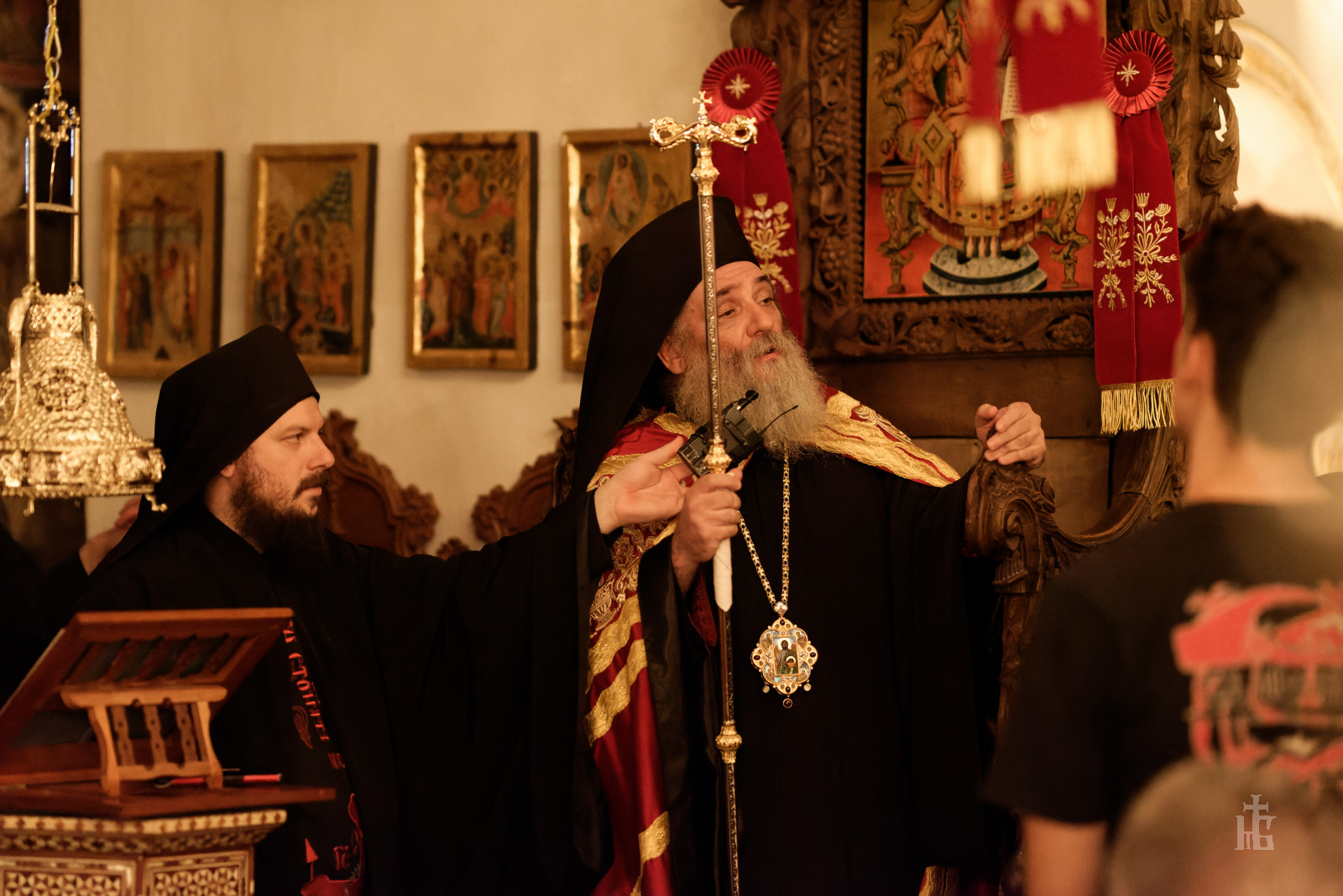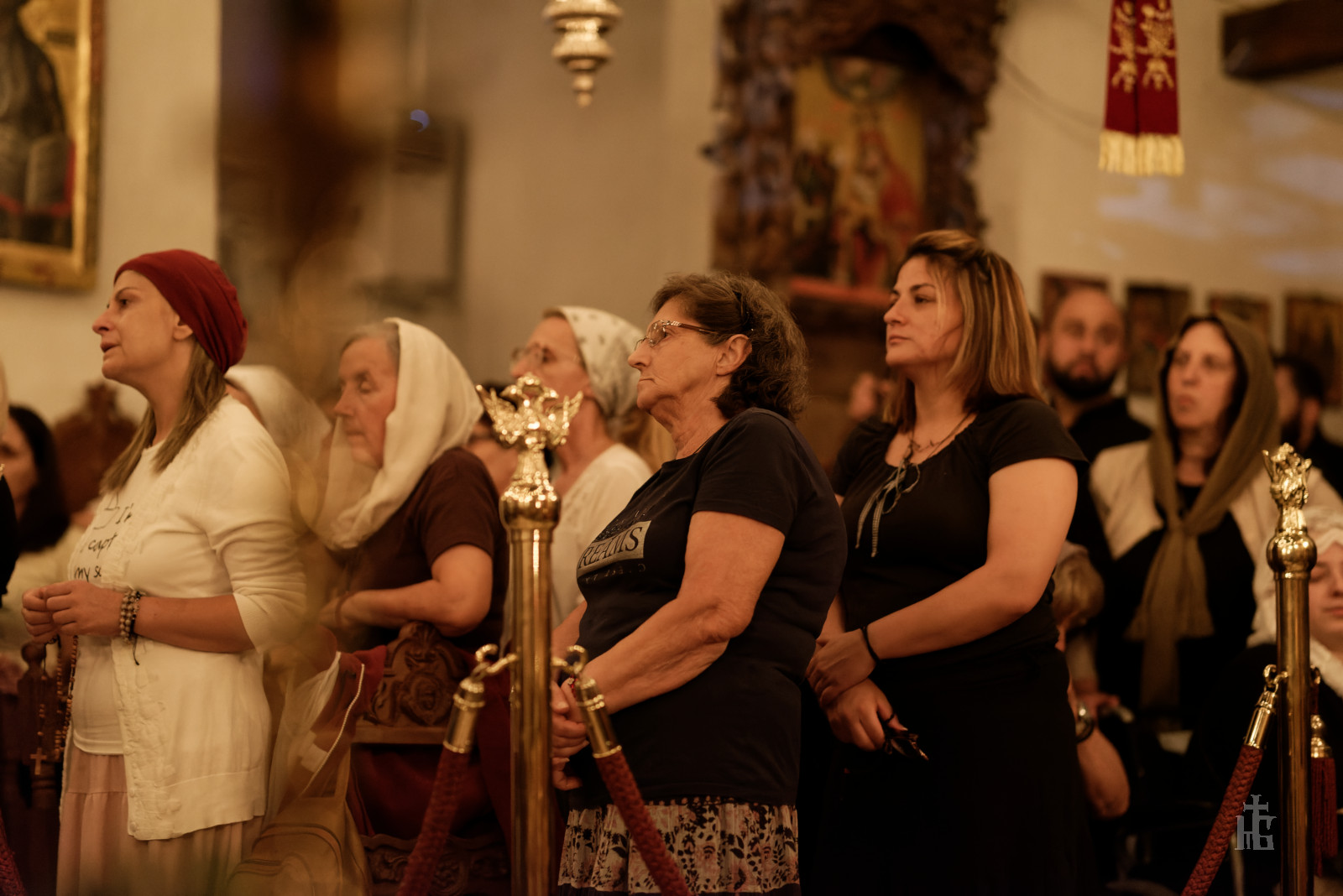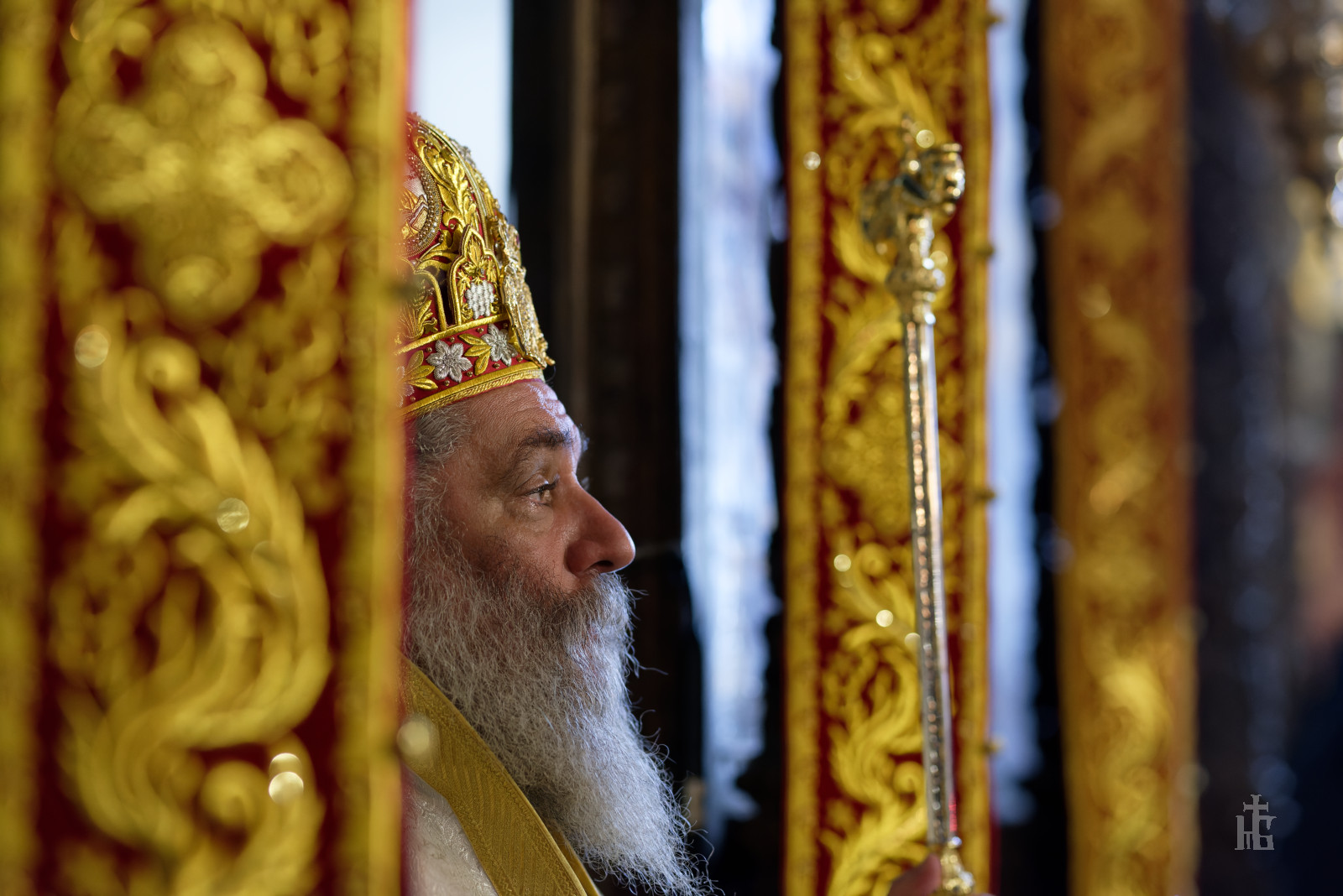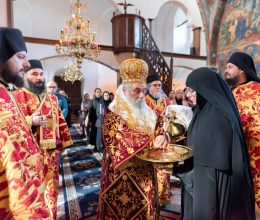A Sermon by His Grace Bishop Parthenius of Antania, Abbot of the Holy Bigorski Monastery, Delivered at the Vespers Service for the Feast of the Beheading of St. John the Baptist, August 28 / September 10, 2023 A.D.
In the name of the Father, and of the Son, and of the Holy Spirit!
“Wondrous is God in His saints!” (Psalm 67:36). Indeed, wondrous is our God, who reveals Himself and is glorified through His chosen ones. Once again, this year, He, the Merciful One, has deemed us worthy to bow before the image of the greatest among the saints, the greatest of all people—the honorable and glorious Prophet, Forerunner, and Baptist of Christ, St. John. Even the very lips of our Savior exalt him, declaring: “Among those born of women, there has not risen one greater than John the Baptist” (Matthew 11:11). Truly, after the God-man Christ Himself and the Most Holy Theotokos, St. John is the greatest human to have walked the earth.
This holy monastery is itself a testament to his greatness, for how often has he been glorified within its walls. Thus, tonight, we stand with faith before his miraculous icon and his holy relics, offering him our prayers and tears. We seek his intercession as the greatest of prophets, but also as an apostle, martyr, and angel in the flesh. Wondrous St. John! For more than a thousand years, people have stood with tears before this sacred icon, lifting their prayers to this great Prophet of Christ, the Forerunner, and Baptist, and their prayers have always been heard. You see, this sanctuary has been built upon the firmest spiritual rock, as the Lord Himself teaches in the Gospel with the parable of the wise man who built his house on the rock, and when the floods came, they could not bring it down (cf. Matthew 7:24). Over a thousand years ago, St. John the Forerunner called his patron, St. John of Debar, Archbishop of Ohrid, to establish this holy place here as a lighthouse upon a high and solid rock, so that all of us sailing through the stormy sea of life, beset by trials, might have a guiding point. With faith, we can gaze upon the unfading beacon of St. John, who always goes before Christ, proclaiming Him, interpreting Him, and illuminating the path toward Him.
And how does he illuminate the way? When does that path become bright and clear for us? It is only when we hear and receive in our hearts the message of the preacher at the Jordan: “Repent, for the Kingdom of Heaven is at hand!” (Matthew 3:2). Repentance begins when we start to recognize and confess our own sins and weaknesses, when we look inwardly and realize how far we have strayed from God’s truth and righteousness. Then, we need to humble ourselves, confess, and strive to transform our hearts gradually.

This Prophet of God, whose memory we celebrate today, calls us precisely to this: first to repentance, and then to the most important virtue—humility. In the Holy Gospel, we read that St. John was profoundly humble. It is truly moving and awe-inspiring! Though he was the only one who received the gift of prophecy even from his mother’s womb, he never regarded himself as anything great. You know the moment from the Gospel when his mother, the righteous Elizabeth, met the Mother of God. At that very moment, St. John leapt with joy in her womb, announcing, even as an unborn child, that the Most Holy Theotokos was bearing the Savior of the world. Yet later, when people saw something extraordinary in him—a prophet of great power in both word and deed, an ascetic without equal, and a miracle worker—they began to ask him who he was, inquiring with ever greater expectations.
They started by asking if he was the Messiah, for in him they saw the possibility of someone truly great. To this, he humbly replied, “I am not the Christ.” Then they asked, “Are you Elijah?” He answered, “I am not.” They continued: “Are you the Prophet?” And again, he said, “No.” Finally, the priests from Jerusalem pressed him: “Who are you, so that we may give an answer to those who sent us? What do you say about yourself?” In great humility, St. John replied, “I am the voice of one crying in the wilderness: ‘Make straight the way of the Lord'” (cf. John 1:19-23).
Imagine that—the one whom the Son of God Himself called the greatest among those born of women describes himself as merely a voice. And he adds, “I am not worthy to untie the strap of His sandal” (i.e., Christ’s) (John 1:26).
According to the tradition of the Church, St. John was orphaned early in life and was raised by the Nazirite community—a kind of Old Testament religious order, similar to monasticism. The Nazirites took vows to dedicate themselves entirely to the service of God for a specific period. These Old Testament monks raised John in the wilderness, nurturing him as a child of the desert, in the harshest conditions and with the utmost austerity. Because of his strict asceticism and complete detachment from worldly comforts, the Church also refers to him as an “angel in the flesh” and a “heavenly man.” He truly lived almost without a body, like an angel of God. For this reason, in ecclesiastical iconography, he is often depicted with angelic wings, symbolizing his immense spiritual stature.
An 18th-century ecclesiastical writer, John of Lind, in one of his homilies on St. John the Baptist, delves into the mystical meaning of the letters in the name “John.” He reflects that, in both Greek and Church Slavonic, the name begins with the letter ι (iota), or “Izhitsa” (И). In both ancient writing systems, this letter represents the number ten. According to this author’s interpretation, the fallen rank of angels, led by Lucifer, will be replaced by the monks, who will form the tenth rank of angels, complementing the existing nine. This is why the monastic schema is called “angelic.” And at the head of this angelic rank of monks stands none other than the honorable Forerunner.
We can say that St. John is the first true monk and remains to this day an unmatched teacher, guide, protector, and father of monastics. All those who strive to follow his angelic life will be the first in Heaven, closest to the Throne of God.
There is also a fascinating account from the life of St. Paisius the Great. In a vision, St. Paisius spoke with the soul of the Holy Emperor Constantine the Great, who had descended from Heaven to deliver a powerful message to him. You all know how much St. Constantine did for Christianity and that the Church honors him as Equal-to-the-Apostles and Great. Yet listen to what he told the humble monk: “Blessed are you who have been deemed worthy to follow the monastic life. I am Constantine the Great, and I have descended from Heaven to reveal to you the glory that monks enjoy in Heaven. Oh, how I wish I had abandoned my earthly kingdom, my royal robes, and crown to become poor, wearing a hair-shirt and embracing the hardships of monastic life!”
Can you imagine? Even the great Constantine, adorned with divine glory and honor, is lesser than the simplest monk in the Kingdom of Heaven!

Monasticism, my brothers and sisters, is truly a great thing. Therefore, I ask you, dear faithful, to pray earnestly to St. John the Baptist for the monastic order. He has performed a tremendous miracle for this holy sanctuary of ours at the end of the 20th and beginning of the 21st century by reviving the monastic way of life here. He has chosen children from among our own, from the wombs of our mothers, from our people. He has called those who are appointed to pray day and night, to strive tirelessly in prayer, thanksgiving, vigilance, and ascetic labors—interceding for the people who so desperately need their prayers.
This is why I ask you, dear faithful, always to pray first and foremost for those who stand at the forefront of the spiritual battle against the “spiritual hosts of wickedness in the heavenly places” (Ephesians 6:12)—the monks and the priests. If they—God forbid!—were to fall, the whole flock would fall with them. A great saint and prophet from our Balkan lands, St. Cosmas of Aetolia, once said: “When priests and monks become like worldly people, then the worldly will become like demons.” Do you see how important it is for this world that monks, priests, and bishops remain faithful to their calling?
Pray for them. I ask this of you because the times we are living in are extremely difficult and deceitful. In the past, the monastery walls and closed gates offered good protection from worldly temptations. But now it is no longer so. Technology has reached everywhere. While it is not inherently evil, it becomes harmful when misused by those who have fallen away from God. Now the world can enter even the monk’s cell—and from there, into his heart. It is not easy today, in this era of apostasy, for a young person not only to leave behind everything of the world but also to remain spiritually strong amidst so many temptations, to grow in the spiritual life, and to become an example, just as St. John was—the voice crying in the wilderness.
And yet, thanks and glory be to him, for even in these challenging times, he calls faithful servants who carry his message of repentance.
St. John cried out boldly, from the depths of his heart, in the wilderness, and many followed him—even those curious onlookers who had no particular desire for repentance. They came out of curiosity, but upon seeing the man in the wilderness whom everyone spoke of—a man who always spoke the truth, unafraid of any earthly authority—they bowed their heads in reverence before him. When hypocritical priests, Pharisees, and Sadducees came to see him with no intent of repentance, only out of curiosity, he rebuked them: “Brood of vipers! Who warned you to flee from the wrath to come? Bear fruits worthy of repentance!” (Matthew 3:7-8). And even Christ asked the people: “What did you go out into the wilderness to see? A reed shaken by the wind? But what did you go out to see? A man clothed in soft garments? Indeed, those who wear soft garments are in kings’ houses. But what did you go out to see? A prophet? Yes, I say to you, and more than a prophet!” (Matthew 11:7-9).
St. John, therefore, called the hypocritical priests and believers a brood of vipers, knowing that there was little hope for their repentance. But let us not be like them, my dear ones. We call ourselves Christians, yet often we harbor more curiosity than genuine faith. We attend churches and visit monasteries, but more out of curiosity. We go to see what is there, and sometimes we even judge what we see. How dreadful! And all the while, St. John calls us. The Kingdom is open. “Come,” he says, “come to Christ!” And he shows us the One whom we must follow: “Behold! The Lamb of God who takes away the sin of the world!” (John 1:29).

My beloved monks and nuns, we are the ones called to carry this voice within us, to show the Lamb of God to the people. I know it is not easy, but we are the ones who have been chosen. Each one of us was called in a different way, yet all of us were personally called by Christ through the Holy Spirit and His grace. He has given us the strength to perform the holiest act—to take up the cross of self-denial.
Some of us were deeply lost in the world, unaware of God. We had to hit rock bottom and come here to find new life. It was here that God’s voice reached us, calling us to become monks, to enter into the most sacred vocation, to put on the new baptism. For monasticism is indeed a second baptism—a chance for a new beginning. It allows the old man, “which grows corrupt according to deceitful lusts” (Ephesians 4:22), to die, and the new man to be reborn in Christ Jesus. Therefore, we must never betray the calling to which we have committed ourselves. I beg you—please! Hear the voice of St. John, calling us to repentance, humility, and prayer.
Look at the world around us and see how dreadful a place it has become. This is partly due to our own falling away, to the apostasy of all of us Christians, for we do not pray enough or repent sincerely. Beware! Let us not become like Herodias and Salome, collaborators with the devil, concerned only with feasting and pleasures. For it is at such revelries that the head of a righteous man is always taken. This was the case at Herod’s birthday celebration, held in complete indulgence, drunkenness, and immorality. The sinful and corrupt mother demanded the head of the righteous man.
My dear ones, when we allow ourselves to live in negligence, indulgence, and worldly pleasures rather than in spiritual struggle, we become like Herodias and Salome, who demanded the head of the Baptist on a platter. It is good for us always to remember the Beheading of the Forerunner, for we Christians—especially monks and priests—bear the greatest responsibility. As a bishop, abbot, and spiritual father, I am accountable before God for the monks with me. Therefore, I ask you, dear faithful, not to support or encourage worldly behavior among them. They are human and can make mistakes, but do not assume that worldly behavior is natural for a monk. If you notice anything inappropriate, you have the right to correct them with love and humility: “Father, I don’t like the way you are behaving or speaking.” And if one of them falls, do not support them in their fall.
By God’s grace and through the prayers of St. John, despite the waves and storms, we stand firm on our feet this evening, spiritually enduring on the eve of his feast. Know that the devil attacks especially fiercely before great feasts, stirring up many temptations. Yet St. John, our beloved protector, has brought everything back to its proper place, and here we are, gathered before his thousand-year-old miraculous icon with gratitude.
Through this icon, he guards, blesses, and strengthens us—and all of you who come to honor him. Even now, he points us to the path leading to the Lamb of God, who takes away the sins of the world. Embrace his message and keep it firmly in your hearts, so that you are not overwhelmed by the stormy seas of life, stirred by countless passions and temptations.
The beacon of St. John shines brightly here, and anyone who navigates by it will not be wrecked by temptation, sudden storms, or hidden rocks beneath the sea of life.
May you all be blessed, and may St. John be with you!
Amen.















